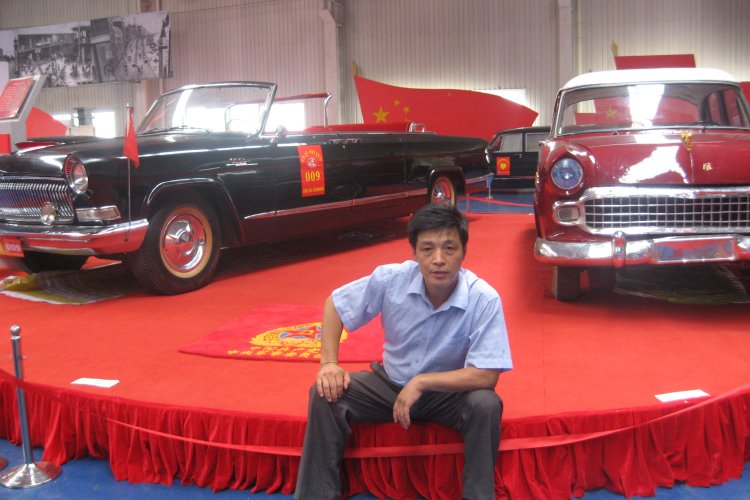Peter Hessler Says Goodbye to China
When author Peter Hessler left China in 2007, it was not simply a physical relocation. The move marked an intentional change in the direction of his writing career – a career forged on his intimate portraits of a Chinese society in flux and transitioning into the new millennium. Recently Christine Laskowski spoke to Hessler to ask him whether his new book, Country Driving – A Journey Through China from Farm to Factory, really marks his farewell to the Middle Kingdom.
The inside jacket of Country Driving calls this the third and obviously last in a trilogy. Is that the case? Is China still where the stories are for you?
When I was working on Oracle Bones [Hessler’s second book] I could see I would do a three book set. I moved out of China in 2007 and went back a couple times in 2008, but I basically decided that this would be the end of my China writing. As a writer it's better to have a range of subjects, and I think now's a good stopping point. The expectation is that my wife and I will go to a different part of the world and study a different language.
Where are you thinking?
We're thinking about moving to the Middle East.
So it seems you're after the hardest languages – first Chinese now Arabic or Farsi?
I'm curious to see what it's like to start over. I find it interesting to start learning a language later in life. In the Peace Corps a lot was learned on the street or on the fly [Hessler first came to China as a teacher with the Peace Corp, an experience described in his first book River Town]. There are a lot of things you can't even put your finger on. I think that's one of my better skills – there are certain unspoken things that I do.
Could you give us an idea of what those unspoken things are?
I don't know how to characterize it. What I did in Fuling [the city in River Town] was very hard. We had two months of Chinese, we were the only two foreigners and had people staring and laughing everywhere we went. After a few months I realized it could either drive you nuts or you could embrace it, and so I just learned to embrace the kind of attention they were giving me. I wanted to learn Chinese and they wanted to talk, so I made it my routine to go around to tea houses and around town.
I became very comfortable talking to people informally and talking to strangers. Chinese people like to talk, but they're not efficient conversationalists. They're not in a rush.
How do you manage to extract the information you extract? Do the people you write about understand that they're characters in widely-read books?
There's a lot of things I didn't write about because they were personal. Some of it is a judgment call. It's an issue you have as a nonfiction writer.
With River Town, most people had not read it in advance. The reaction was much more positive that I expected. The pace is so fast, it was almost old by the time they read it. Nobody takes those boats anymore, the old part of that town is gone and people are a bit nostalgic, simply because of the pace of change.
What's your method for getting all of these details down? Do you just stop and jot things down or do you use tape recorders?
Generally I take a lot of notes by hand, in English and throw in Chinese words that seem important to me. Or if there's something I don't understand I write it down in my notebook.
Usually on that trip [in Country Driving], if I had a conversation I would drop someone off and then write, and then enter it into my computer very quickly. Entering handwritten notes, you remember other things and that's really important. I've always been a very careful note taker, even before I knew what I was writing about. Just describing scenes and transcribing students' assignments [when I was in Fuling]. You can't tell what's useful, so it's important to have it all down.
I enjoyed the part of Country Driving when you talk about Wei Jia's evaluations or report card at school, and you make a really astute point: "A foreigner feels most foreign while witnessing the early education of another culture…”
When I taught in Fuling it took me a long time to come to grips with that. These kids were incredibly eager, appreciative and came from families with very little. It was really inspiring to teach there. I began to learn about the political issues with how things were structured and became very cynical as we [he and Adam, a fellow Peace Corps volunteer] began to realize that the administration was preventing the students and teachers becoming close. We began to realize that these people who were very educated couldn't talk to us, but the noodle guy could...
I believe there are lots of flaws in the Chinese education system... I was never a group person. I did sports, but apart from that I really hated that side of school. I think it's very hard to be like that in China, to be that individualistic. But part of what I'm doing is giving my own reaction. I want the reader to know that this is a Western perspective… [Chinese education] isn't designed to prepare kids to be me, but to prepare them for society. Just as Wei Jia does self-criticisms in school, his father is doing the same self-criticisms as an adult in the village. It can be a hard issue to describe to foreigners.
A lot of what I enjoy about your writing is that you write about the absurdity and frustrations of living here and yet you're never acerbic. How do you manage that, living here for as long as you have?
That is a lot easier for me than a lot of people. My job as a writer limits how frustrated I get and makes it easier for me to be philosophical about things. It's true in Fuling I did work in the system and I would often be very angry and have very emotional reactions. There's all sorts of things I'm dealing with, but the only person I can blame is myself – if I didn't want to deal with it I'd just stay home or go back to America.
There seem to be more details about the junk food for your road trip in Country Driving than your personal life. Can your readers ever hope for more details about yourself?
I think eventually I will write a memoir. I think for a book like this what really energized me were the people I met in these places, so it’s better for me to be in the background.
Any thoughts for aspiring China writers?
I don't publish a lot of stories. I write about 3-4 stories for magazines a year. I've written three books in a decade. I'm not blogging and not cranking out a lot. I don't need to, and that's been my decision. I think blogging or something like twitter are not good for someone that's doing something like a book, a long project. For young writers, they're not good training for long form narrative writing. It's good to spend time with your materials and those things encourage you to move very quickly. If you're writing a book you have to be very patient with it.
Fuling was the last time I was without internet access and that really helped. I think if I had been on the web at that time, it wouldn't have really forced me to engage deeply with that place. It’s one of the issues a young writer has to deal with. Now at my age the internet doesn't threaten me. For someone who is 25 it's a tougher path.
Related stories :
Comments
New comments are displayed first.Comments
![]() ReneeWine
Submitted by Guest on Tue, 06/08/2010 - 10:29 Permalink
ReneeWine
Submitted by Guest on Tue, 06/08/2010 - 10:29 Permalink
Re: Peter Hessler Says Goodbye to China
.
Validate your mobile phone number to post comments.






